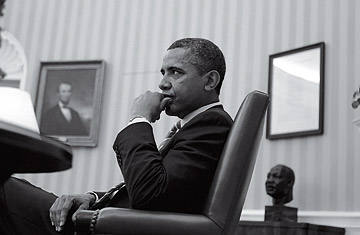
(6 of 7)
Crisis management, effective or ineffective, is not strategy. Obama has been determined to draw down America's military interventions and limit its commitments in places like Iraq and even Afghanistan so that he could focus U.S. foreign policy on America's core interests. These he has defined as its dealings with the great powers and its embrace of larger global issues. He has reset relations with Russia, built on the growing ties with India, established a close working relationship with Turkey and maintained the historical connections with European allies. But the biggest upgrade in U.S. relations has been in Asia. The strategy of "rebalancing" might well be the centerpiece of Obama's foreign policy and what historians will point to when searching for an Obama Doctrine. It is premised on a simple, powerful recognition. The center of global economic power is shifting east. In 10 years, three of the world's five largest economies will be in Asia: China, Japan and India. The greatest political tensions and struggles might also be in Asia as these countries seek political, cultural and military power as well. If the U.S. is going to be the central global power, it will need to be a Pacific power.
In a speech to the Australian parliament, Obama signaled America's intent. "The United States is a Pacific power, and we are here to stay," he said. The President promised that despite serious defense cuts that would affect all aspects of the military, there would be no cuts in Asia. Over the past year, the Administration launched a series of diplomatic efforts that culminated at year's end with a flurry of initiatives. The U.S. will establish a military base (of sorts) in Australia, expanding its reach in the Pacific. It has launched a transpacific trade accord, which, if negotiated, would be the largest trade deal since NAFTA. It re-established ties with Burma, thus gaining influence with a pivotal country that borders China and India. And it partnered with other Asian countries at the East Asian summit to limit Chinese influence and claims on the South China Sea.
The pivot to Asia has been highly effective, taking advantage of China's belligerence. But the Administration must now work to build an affirmative vision of an Asia that is not banded together against China but rather is open, diverse and plural. The real challenge is to convince China that it benefits from the stability, rules and prosperity that such a vision would produce (just as Germany benefited from a peaceful and prosperous Europe with it at the center) and to persuade the Chinese that they are better off with such an Asia than one characterized by geopolitical competition. So far, Washington's relations with China have not reached the level of serious strategic dialogue that will be necessary to achieve any true global cooperation in the years ahead. Going forward, U.S. security and prosperity depends on a productive relationship with China more than with any other country.
